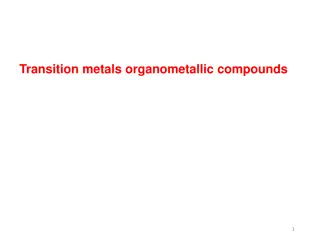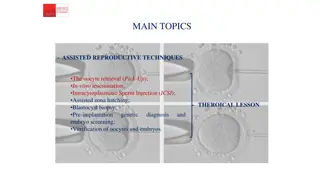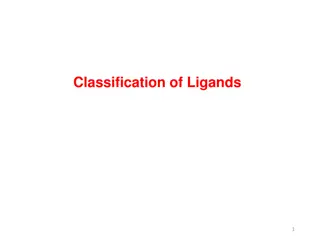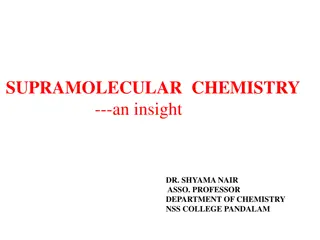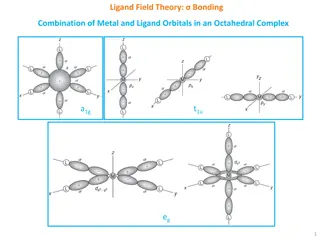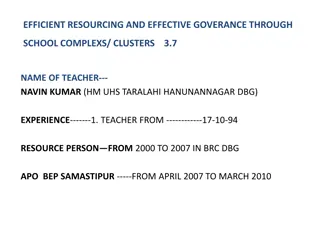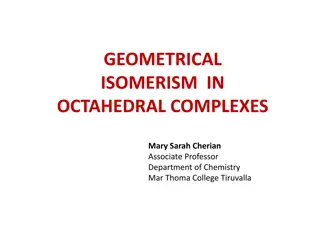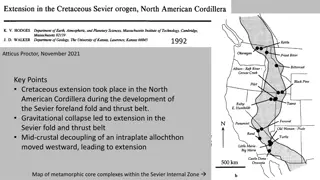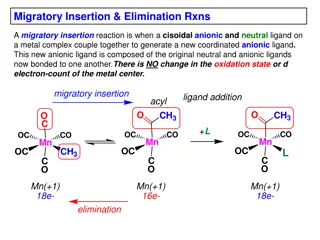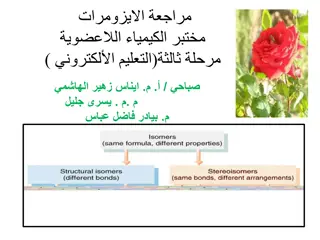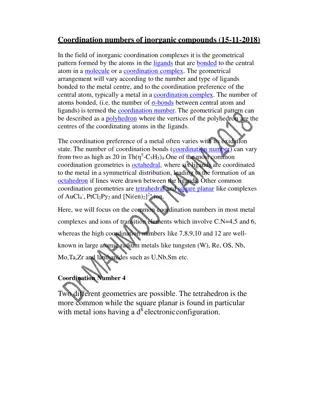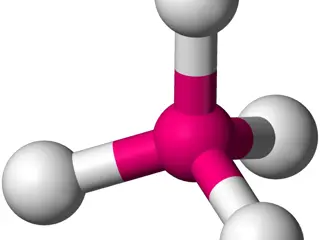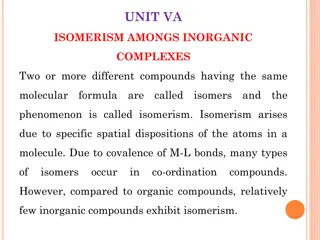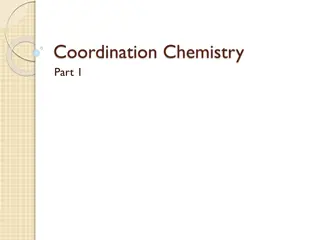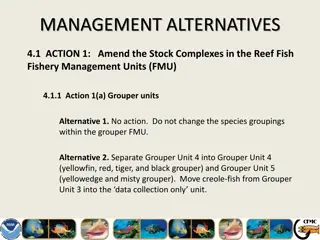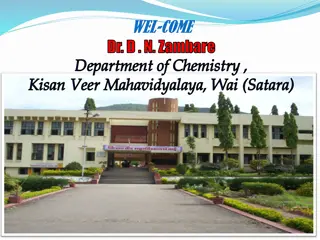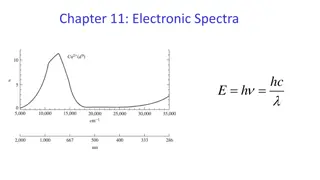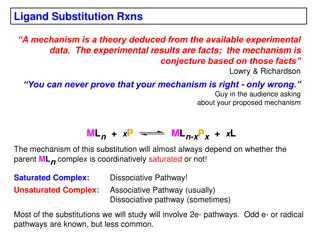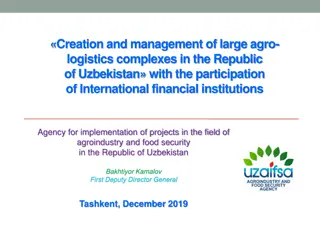Commercial Epoxy Floors Michigan
Commercial Painting Services provides the Rochester, MI. market with high-grade epoxy and urethane flooring surfaces installations for all types\nof commercial & industrial complexes.https:\/\/commercialpaintingservices.com\/commercial-epoxy-floors-michigan\/
2 views • 13 slides
Epoxy Flooring Contractors Goshen IN
Commercial Painting Services offers the Monroe, MI. with high-grade epoxy and urethane floor surfaces setups for all kinds of commercial & business complexes.https:\/\/www.commercialpaintingservices.com\/epoxy-flooring-ann-arbor-michigan\/
1 views • 12 slides
Transition Metals Organometallic Compounds Overview
Transition metals bonded with organometallic compounds like metal alkyls, aryls, and hydrides are common in chemistry. Ligands are crucial for stabilizing these complexes, with carbon-based ligands exhibiting diverse binding modes based on the metal's hybridization state. Preparation methods for tra
1 views • 25 slides
Assisted Reproductive Techniques: Oocyte Retrieval Process
The process of oocyte retrieval in assisted reproductive techniques involves the careful retrieval of cumulus-oocyte complexes from follicular fluid under anesthesia and ultrasound guidance. These complexes are then sorted and stored before further procedures such as in-vitro insemination or intracy
1 views • 13 slides
Crystal Field Theory in Transition Metal Complexes
Crystal Field Theory (CFT) explains the colors and magnetic properties of transition metal complexes. It focuses on the energy changes in d-orbitals of metal ions caused by surrounding ligands. This theory, developed in 1929, provides insights into the bonding interactions in complex compounds. The
10 views • 44 slides
Ligands and Metal Carbonyl Complexes: A Comprehensive Overview
Explore the classification of ligands in metal complexes, including alkyl, aryl, and carbonyl ligands. Learn about the unique properties of carbonyl ligands, their preparation methods, and the molecular orbital diagram illustrating CO-metal bonding interactions.
5 views • 35 slides
Swing Barrier Gate Entrance Automatic
A swing barrier gate entrance is a type of entrance control system commonly used in areas where security and access control are important, such as office buildings, residential complexes, and public transportation stations. These gates consist of a series of horizontal bars or panels that swing open
0 views • 1 slides
_Live Oak Contracting Elevates Multifamily Construction companies in Jacksonville, FL (1)
Leading multifamily construction companies in Jacksonville, FL, specialize in designing and building apartment complexes, condos, and townhomes. With expertise in local regulations and sustainable practices, these companies create modern living spaces tailored to the city's growing population. They
0 views • 2 slides
Flats for sale in Lucknow | Experion
If you're considering purchasing a flat in Lucknow, Experion Capital by Experion at Gomti Nagar would be the best option for you. The flats for sale in Lucknow at Experion Capital are known for its modern amenities, shopping complexes, and proximity to offices and entertainment hubs. They also offer
2 views • 2 slides
Flats for sale in Lucknow | Experion
If you're considering purchasing a flat in Lucknow, Experion Capital by Experion at Gomti Nagar would be the best option for you. The flats for sale in Lucknow at Experion Capital are known for its modern amenities, shopping complexes, and proximity to offices and entertainment hubs. They also offer
1 views • 2 slides
Top 10 Best Builders in Chennai
Chennai, known for its rapid urbanization and development, boasts a plethora of construction projects ranging from residential complexes to commercial spaces.
0 views • 4 slides
Organometallic Chemistry III: Transition Metal Complexes and Homogeneous Catalysis
Explore the reactivity of transition metal complexes, including bond metatheses and various reactions. Learn about orbital considerations, synthesis, and spectroscopic properties of organometallic complexes. The course covers basics from AC1, focusing on ligands, electron counting, and MO diagrams.
5 views • 8 slides
Epoxy Flooring Bryan Ohio
Commercial Painting Services offers the Bryan, OH. market with excellent epoxy and urethane floor covering installations for all types of commercial & business complexes. \/\/ \/epoxy-flooring-bryan-ohio
1 views • 13 slides
Epoxy Flooring Rochester Michigan
Commercial Painting Services provides the Rochester, MI. market with high-grade epoxy and urethane flooring surfaces installations for all types of commercial & industrial complexes. \/\/ \/epoxy-flooring-rochester-michigan
0 views • 13 slides
Exploring Supramolecular Chemistry: Insights and Applications
Supramolecular chemistry delves into the chemistry of molecular assemblies, intermolecular bonds, and non-covalent interactions, leading to the formation of supra-molecules through aggregation of molecular subunits. Concepts like molecular recognition, self-organization, and host-guest chemistry pla
0 views • 18 slides
Understanding Ligand Field Theory in Octahedral Complexes
Ligand Field Theory explains the bonding interactions between metal and ligand orbitals in octahedral complexes. This theory involves the combination of metal and ligand orbitals to form molecular orbitals, leading to specific electronic configurations. The overlap of metal and ligand group orbitals
1 views • 10 slides
Understanding Cultural Traits and Complexes in Society
Culture is a complex whole that encompasses various aspects such as knowledge, beliefs, arts, morals, laws, customs, and more. Cultural traits, at the simplest level, are individual tools, acts, objects, or beliefs related to specific situations or needs, while cultural complexes are groups of inter
0 views • 18 slides
Understanding Crystal Field Theory in Chemistry
Crystal Field Theory (CFT) explains how electron orbital degeneracies, particularly d or f orbitals, are affected by a static electric field generated by neighboring anions. In CFT, the metal ion is considered positive while ligands are negative charges, leading to attractive and repulsive forces af
0 views • 13 slides
Efficient Resourcing and Effective Governance in School Complexes
This initiative aims to enhance school governance and resource utilization through the establishment of school complexes/clusters. By pooling resources, sharing staff, and promoting collaboration among schools, the system seeks to improve educational outcomes, support children with disabilities, and
0 views • 18 slides
Understanding the Applications and Design of Analytical Ultracentrifugation
Analytical ultracentrifugation, a powerful technique in biochemistry, allows for precise measurement of sample properties and characterization of macromolecular complexes. The method is widely used for determining sample purity, equilibrium constants, and assembly mechanisms of biological complexes.
1 views • 17 slides
Understanding Enemark-Feltham Notation in Iron-Nitrosyl Complexes
Iron-Nitrosyl complexes are redox non-innocent, with NO exhibiting multiple redox states. Enemark-Feltham Notation helps in determining metal-ligand interactions and oxidation states. Detailed information on NO ligands, bonding characteristics, and methods for analyzing iron-NO systems are discussed
0 views • 6 slides
Role of Transition Metal Complexes in Cancer Treatment
Transition metal complexes, such as platinum (II) compounds like cisplatin and carboplatin, have shown significant efficacy in treating various types of cancers. These complexes offer a promising approach for combating cancer with reduced side effects. Additionally, new generation compounds like pic
0 views • 15 slides
Geometrical Isomerism in Octahedral Complexes: A Comprehensive Overview
Geometrical isomerism in octahedral complexes is a fascinating phenomenon arising from different geometric arrangements of ligands. This type of isomerism is prevalent in coordination numbers 4 and 6, leading to two main types of geometric isomers. Examples of cis-trans and mer-fac isomers in MA2B4
5 views • 10 slides
Evolution of Sevier Orogeny and Cretaceous Extension in North American Cordillera
The Sevier Orogeny in the Cretaceous period led to extension in the North American Cordillera, with gravitational collapse playing a key role in the development of the Sevier fold and thrust belt. The internal zone consisted of metamorphic core complexes and Mesozoic-Paleogene plutons, showcasing ev
0 views • 5 slides
Insights into Migratory Insertion and Elimination Reactions in Metal Complexes
Migratory insertion in metal complexes involves the coupling of a cisoidal anionic and neutral ligand to form a new coordinated anionic ligand without changing the metal center's oxidation state or d-electron count. This process requires cisoidality between the reacting ligands and a vacant coordina
0 views • 19 slides
Understanding Angular Overlap Method in Advanced Inorganic Chemistry
Exploring the Angular Overlap Method (AOM) in advanced inorganic chemistry provides a qualitative discussion on the physical rationale behind the theory of complexes. By considering the interaction of atomic orbitals and the degree of overlap, AOM offers insights into energy quantification in coordi
0 views • 15 slides
Overview of Chelating Agents in Pharmacology
Chelating agents are organic compounds that bind with heavy metal ions to form non-toxic complexes excreted in urine. Dimercaprol, Succimer, Edeta, Calcium disodium edetate, Penicillamine, and Desferrioxamine are key examples used in treating metal poisoning by forming stable complexes with metals f
0 views • 12 slides
Understanding Geometrical Isomers in Potassium Chromate Complexes
Explore the preparation methods, crystal shapes, and properties of cis and trans isomers of potassium chromate complexes. Learn about the use of oxalic acid and potassium dichromate, compare the two isomers, and understand the oxidation and reduction reactions involved.
3 views • 8 slides
Coordination Numbers in Inorganic Compounds: Geometries and Structures
In inorganic coordination complexes, the coordination number refers to the number of atoms bonded to the central atom. Common geometries include octahedral, tetrahedral, and square planar, depending on the type and number of ligands. Transition metal complexes exhibit different coordination numbers
2 views • 8 slides
Crystal Field Theory and Color Exhibited by Coordination Compounds
Crystal Field Theory (CFT) explains the colors exhibited by coordination compounds based on the absorption of light and electron transitions in d-orbitals. The theory describes how ligands interact with transition metal ions, causing the d-orbitals to split in energy levels. This split results in th
0 views • 30 slides
Isomerism in Inorganic Complexes: A Comprehensive Overview
Isomerism in inorganic complexes is a fascinating phenomenon arising from the specific spatial arrangements of atoms within molecules. This article delves into the types of isomerism found in coordination compounds, such as structural isomerism and stereoisomerism. The importance of studying isomers
0 views • 67 slides
Insights into Coordination Chemistry Elements and Complexes
Transition elements with d or f electrons possess unique properties, play crucial roles in biological processes, and form colorful complexes with ligands. Occurring widely in nature, these elements have varied oxidation states and coordination numbers. Werner's formulation sheds light on primary and
0 views • 41 slides
Transcription Initiation and Elongation in Eukaryotes Explained
Transcription initiation in eukaryotes involves RNA Polymerase II, general transcription factors, and Mediator complex to communicate with activators. Chromatin remodeling complexes and histone-modifying enzymes play pivotal roles in transcription regulation. Elongation requires different factors an
0 views • 18 slides
Reef Fish Fishery Management Alternatives Overview
Amend the stock complexes in the reef fish fishery management units by considering different actions for the grouper and snapper units. The proposed alternatives aim to redefine management reference points for various species groups within the snapper, grouper, and parrotfish complexes. These adjust
0 views • 38 slides
Understanding Coordination Complexes and Transition Metals
Today's lecture covers transition elements, coordination complexes, ligand types, geometries, naming, isomers, and bonding in coordination complexes. Transition metals form coordination complexes with metal ions, ligands, and counter ions. The types of ligands include monodentate and bidentate ligan
0 views • 24 slides
Introduction to Creating Simplicial Complexes from Data
Learn how to create a simplicial complex from data points through a step-by-step process. Starting with 0-dimensional vertices and defining closeness between data points, progress to adding 1-dimensional edges. Ideal for those interested in topological data analysis across various fields.
0 views • 73 slides
Understanding Chelation Chemistry: Structural Requirements, Ligands, and Applications
Chelation chemistry involves the formation of specific complexes known as chelates, characterized by ligands that coordinate with a central metal ion. This article explores the structural requirements for chelate formation, the role of chelating agents like EDTA and DMG, and the difference between m
0 views • 27 slides
Understanding Electronic Spectra and Transition Metal Complexes
Explore the world of electronic spectra, absorption bands, and transition metal complexes through various diagrams and explanations covering topics like d-d transitions, free ions, microstates, and charge transfer transitions. Discover the reasons behind the coloring of octahedral compounds despite
0 views • 22 slides
Understanding Ligand Substitution Reactions in Metal Complexes
Ligand substitution reactions in metal complexes involve the replacement of one ligand with another, impacting the coordination around the metal center. The mechanism of these reactions, associative or dissociative, is influenced by factors like coordination saturation and electron count. Experiment
0 views • 20 slides
Implementation of Large Agro-Logistics Complexes in Uzbekistan
The Republic of Uzbekistan is focusing on creating and managing large agro-logistics complexes to enhance food security and agribusiness development. Government programs and international financial institutions are instrumental in funding and implementing these projects, aiming to increase agricultu
0 views • 13 slides


